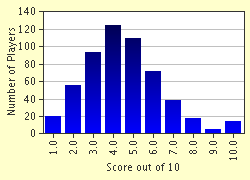Quiz Answer Key and Fun Facts
1. What was it that made hatters mad, which led to the expression 'as mad as a hatter'?
2. What object is the expression 'cold enough to freeze the nuts off a brass monkey' referring to?
3. On which book of the Bible is the following expression based: 'The writing's on the wall'?
4. From which Shakespearean play does the expression 'parting is such sweet sorrow' derive from?
5. Which author is generally credited with having popularised the expression 'I'll eat my hat'?
6. To be up for a 'keelhauling' means to be up for a severe reprimand. The expression actually derives from a naval punishment. What was a keelhauling?
7. The phrase 'to upset the apple cart' actually comes from a poem that was written as an attack against which famous Revolutionary of the United States of America?
8. The expression 'You can't teach an old dog new tricks' comes from a book written in 1523 entitled 'Treatyse Moost Profytable for Husbande Men'. Who was the author?
9. When one gets off 'Scot free', they relieve themselves of a burden they should otherwise been liable for. What originally was the word 'Scot' referring to?
10. Who came up with the expression 'do or die'?
Source: Author
TemplarLLm
This quiz was reviewed by FunTrivia editor
gtho4 before going online.
Any errors found in FunTrivia content are routinely corrected through our feedback system.

